- Home
- Sean Platt
Yesterday's Gone (Season Four): Episodes 19-24 Page 4
Yesterday's Gone (Season Four): Episodes 19-24 Read online
Page 4
He crawled deep under the covers with his biggest pillow, then hugged it close to his body, and pulled the comforter up high over his head; there was better thinking inside the fort.
Luca wondered if it was still faking if he said his stomach hurt worse than it did. It wasn’t stay-at-home bad, yet, but it might be later. It probably would be later. Then again, Luca had been getting the headaches, and they did worry Mom. That might be the best way to play it. Dad was more worried about his stomach aches, and Mom his head. Luca decided he’d know which hurt more once one of them came to check on him.
Luca usually hopped right out of bed and ran downstairs for his waffle, thinking about warm syrup on the way. He took his showers before bedtime, right before he laid out all his clothes. Mornings were supposed to be easy because Mom was always in a hurry, and she hated to be late. Though she didn’t like to rush him, Luca could tell by her face when she was feeling impatient.
He stayed under the covers, figuring Mom would be up any minute to check on him since his waffle was probably getting cold. After what Luca guessed was 15 minutes of nothing, he heard footsteps outside his door. Not Mom, Dad; Luca could tell because the footsteps were heavy instead of light, just like the breathing.
The door opened, and Dad said, “Luca?”
It took him a moment to answer. To prove his pain, Luca crawled out from under his blankets, peeling them back down over his body. Still, he said nothing, just looked up at his father with wide and what he hoped were sick-looking eyes.
“What’s wrong?” Dad asked, studying Luca.
“My stomach hurts!”
Luca clutched his stomach, over the invisible knives.
“Oh no,” Dad said as he sat on the bed and planted his hand at the back of Luca’s head. “Are you going to be OK? How long has it hurt?”
“All night,” Luca made his voice whiny, but not too whiny since Dad didn’t like that.
“All night?”
Luca nodded. “I couldn’t sleep well, so I’m really, really tired, too.”
“Come on, Son,” Dad said. “You just need some waffles.”
He slipped his arms under Luca’s body, ready to scoop him from the bed like he did when Luca really didn’t want to leave it, but before he could tug, Luca cried out, “No, Dad. I really don’t feel well.”
“I understand,” he said. “You have a bad case of the I don’t want to go to schools. I used to get those all the time, I still do now, except it’s work instead of school. But same thing, Luca, believe me, I get it. But you have to go to school. Anna has to go to school. I have to go to work. Your mother has to go to work. That’s life, we all have jobs. You’re fine. I checked on you a few times last night because I couldn’t sleep, not to mention about 45 minutes ago before you woke up. You were perfectly peaceful, so, Son, let’s get you downstairs and eating your waffle before your mother wastes it and makes you another. Or, you can tell me what’s really wrong.”
Luca wondered how his father was always able to read him so well, and could tell when he was faking something.
Dad waited. Luca crossed his arms and said firmly, “I don’t like school anymore, and I never want to go back.”
Dad laughed. “Wow, that’s quite a difference. What changed your mind? Have they started serving snake in the cafeteria? That’s what did it for me.”
Luca laughed, even though he didn’t want to. Dad knew how to make him do that. “No.”
“Tarantula? It’s tarantulas isn’t it? They’ve started putting tarantulas in the tacos?” Dad slowly shook his head as if absorbing horrible news.
“No,” Luca said, smiling. “No tarantulas.”
“Then what?” Dad held open palms to ceiling. “What could possibly have happened that has made Luca Harding hate school?”
“I just don’t want to go,” Luca insisted. “I’ve learned all I need to know.”
“Oh?” Dad raised his eyebrows. “Well, in that case, I stand corrected. If you already know everything there is to know, then you’re right, and school is clearly wasting your time. We Hardings will have none of that.”
“Are you serious?” Luca asked, daring to hope.
“Absolutely.”
Luca stared at his father, wondering if this would be the first time he finally outsmarted him. “What’s the catch?”
“No catch,” Dad said. “I mean it. I’ll ask you three questions, and if you get all three of them right you don’t have to go to school.”
“OK,” Luca said, feeling deflated already, knowing Dad’s questions would be too hard.
“What’s the capital of California?”
That was too easy; California was Luca’s state.
“Sacramento!”
“That’s right!” Dad clapped Luca on the shoulder. “Hmmm … can you tell me the difference between their and there?”
Luca smiled. That was easy, too. Dad was asking him questions a second-grader would probably know.
“The one with the I is people and the one without it means a place.”
“Very good!” Dad leaned into Luca. “Are you ready for the last one?”
Luca nodded.
“What is the square root of three?”
Luca looked at his father with no expression, not at all surprised that he felt suddenly tricked. “That’s not fair.”
“Why? If you know everything, you should know all about square roots. And three is a teeny, tiny, easy number.”
Luca could figure this out. “What’s a square root?”
Dad smiled. “It’s a number that produces another specified number when multiplied by itself.”
“I don’t understand,” Luca said, determined to get it.
“I’ll give you an example. Eight is a square root of 64.”
That made sense. Suddenly Luca understood. And Dad was right, three was a teeny, tiny number. He pinched his nose, trying to understand, but it was like his brain wouldn’t work. One times one was one, two times two was four, and three times three was nine.”
“You have one minute,” Dad smiled.
“That’s not fair.”
“It’s totally fair.”
“One and a half,” Luca said.
“You’re going to school, Son. The correct answer is 1.73205080757.”
Luca’s eyes went giant. “How did you know that?”
“Stupid trick,” he said. “Now, do you want to tell me what’s really bothering you? I’d love to hear it.” He glanced at the clock on Luca’s desk. “But we have to hurry. I’ll bet the keys on my chain that your mother is already cooking you a second waffle, and if we’re not down there before it gets cold she’s gonna be mad at both of us. So, what’s up?”
He wondered how his dad always got him to say and do what he wanted. Luca didn’t want to tell anyone about Johnny Thomas, or go to school. Now, only a few minutes after Dad came into his room and sat on his bed, he was doing both.
“Johnny Thomas has been picking on me.”
“Johnny Thomas?” Dad scrunched his nose. “Do I know him?”
Luca shook his head. “No, because you’re lucky.”
Dad laughed. “So, what’s he doing to pick on you?”
“He calls me names and always makes me feel stupid.”
“Uh oh,” Dad grimaced.
“What?”
“That means you’re letting him.”
“I’m not letting him!” Luca cried out; that made him mad.
“Well, I don’t mean to upset you, Little Luca, but you kinda sorta are. Bullies only have the power you give them. If you ignore what they’re saying, they have no power at all. My best suggestion, ignore Johnny Thomas. Sooner or later he’ll get bored and find someone else to pick on, someone who doesn’t know how to ignore him.”
“I knew you’d say something like that,” Luca crossed his arms tighter.
Dad gave Luca an understanding smile, then disappeared. He was gone for two minutes before he came back, according to the clock, but because Luc
a was curious, those two minutes felt more like 10.
Dad sat back on the bed and handed Luca a comic book.
Luca was excited for a second, thinking the comic would be about superheroes. But it didn’t look super at all; it actually looked sort of dumb. The colors were bright, and the drawings seemed sort of babyish.
The title was dumb, too: Billy Bully.
Luca looked up at his dad, wearing his not-real smile.
Dad laughed.
“I know it’s not exactly Spiderman, but I promise you’ll like this. Read it on the way to school. You can throw it away when you get there if you want, but I have a feeling you won’t. I’m 44 and I laughed a few times, out loud. Hopefully, the book will help you understand Johnny Thomas better, at least enough to ignore him, and maybe understand yourself a little too, enough to know you’re doing the right thing. We only have a few minutes before we need to leave for school, and we’re already late for getting downstairs, so before we go, do you want to hear my super-fast advice for dealing with bullies?”
Luca rapidly nodded, dying to hear.
Dad pulled him closer. “Look, Luca, I’m not going to lie to you. Bullying sucks, and unless you’re a bully yourself, and sometimes even if you are, most kids go through it at one time or another. You’ve already done the smartest thing by telling someone. You can always ask your parents or friends to help you — there’s safety in numbers — and know what you’re going to say before you say it.” He smiled. “In fact, if you want, we can practice scenarios when you get home from school. Would you like that?”
Now smiling, Luca nodded.
Dad clapped a hand on his shoulder. “Be cool and control the moment, don’t let the moment control you; don’t show Johnny Thomas that you’re sad or mad or anything else. Ignore him, walk away; don’t make it worse.”
Luca threw his arms around his father, suddenly not feeling very sick. “Thanks, Dad!”
Dad told him to hurry, then Luca leapt out of bed quickly got dressed, ran downstairs, mowed through a still-hot waffle — Luca saw two in the trash — then ran outside to the Maxima behind Anna and read his new comic as Mom drove them to school.
Dad had helped Luca feel better, and so did the comic, but he still spent the whole morning dreading recess and gym, because he was sure Johnny Thomas would make his move. All the advice in the world couldn’t give Luca the super powers he needed to stand up to the school’s biggest jerk, who, despite his big, giant, bullying mouth never seemed to travel without his two big, stupid bully friends, Gus and Kiyor, behind him.
Luca made it through recess because he followed the first part of Dad’s advice: Control the moment, don’t let the moment control you. He sat midway up the school’s front steps, reading his Billy Bully comic. It was pretty dumb but kept him smiling anyway. Johnny Thomas and his stupid bully friends kept looking over at Luca, probably making fun of him and his comic, but they never approached him or said anything at all.
Gym was an even bigger worry than recess, so Luca tried not to be scared as the bell rang for fifth period and he changed into his shorts and T-shirt. Luca wished he had told his dad about Johnny Thomas the night before so that he would have already had time to practice what he would say, but since he didn’t, Luca ignored the bully as best he could. That worked at recess, and all the way through the time they played soccer, probably because there were so many other people around. But then the bell rang, and gym ended. Everything inside Luca knew trouble was coming.
He ran into the locker room as fast as he could, faster than he ran when playing soccer, hoping to get in and out before Johnny Thomas or any of his stupid friends saw him. Luca grabbed his backpack and clothes, then ran out from the gym and across the hall to the bathroom in Building E that no one ever used. He went into a stall and changed, happy that it was almost sixth period science and that he had almost made it through the day.
Tonight he could practice with Dad.
Back in his regular clothes, he stepped outside the stall, and the bathroom door swung open — Johnny Thomas stood in the doorway, sneering between Gus and Kiyor. All three stepped inside, blocking Luca’s exit.
Luca stared at the boys, trying not to be scared and wondering what he should do. Before he could decide, Johnny Thomas was right in front of him, yanking the backpack from his shoulder. With the backpack in his hands, Johnny pushed Luca to the floor.
Laughter echoed in the bathroom.
Luca figured he’d wait it out, ignore the bullies until they left, but then Johnny Thomas started rifling through his backpack, and laughing hysterically once he found the Billy Bully comic Dad had given him. The fact that they, these bullies, were handling the comic his father had given was awful horrible.
Luca tried not to cry; it was the hardest thing he had ever had to do.
Laughing so loud it was nearly a scream, Johnny Thomas ran around the bathroom waving Luca’s comic over his head, bellowing through his laughter: “Poor little Luca, Luca Crybaby, doesn’t want to get bullied by Billy anymore.”
Then, Johnny Thomas did something that made Luca hate him even more than he already did; he went to a stall, dropped the comic into a bowl, and peed on it, still laughing. He left the stall and said, “Your Billy Bully comic is in the shitter where it belongs,” then shoved Luca back to the ground and walked off laughing.
Luca found his courage and yelled, “Why are you picking on me?”
Johnny Thomas turned and met his eyes. Luca was sure Johnny was going to hurt him, maybe even kill him right there, and nobody could stop him.
Johnny leaned in, sneering, his eyes full of a hate Luca couldn’t understand, “Because you’re a little faggot, and I don’t like you.”
Johnny punctuated the comment with a swift punch to Luca’s balls, sending him to his knees crying out in pain.
The boys all laughed as the bell for sixth period rang, then left Luca balled on the floor, crying.
* * * *
CHAPTER 5 — Mary Olson
Fairfield, Colorado
September 2013
Mary stood in front of the classroom watching as the eighth-graders studied her. She was up next — career day — just as soon as Paola’s teacher, Lindsay Slater, finished introducing her.
Paola was in the third row back, refusing to look up at her mother. She was probably still mad about the previous evening’s argument, or maybe embarrassed that her mom was speaking next. If she was trying to make Mary feel like an intruder in her classroom, it was working.
There was a time when Mary’s baby girl loved spending time with her mom, loved when she had showed up at school for lunch every so often, or helped out with after school activities. Now Paola was 13, and growing ever more concerned with boys and her social standing in the school’s neatly divided cliques. The last thing she wanted was to be seen with her mother.
Mary knew this time would eventually come, it had, in fact, been approaching before The Event when Paola was just 11. But when they returned home from the horrible world following Ryan’s death, something had shifted. They were closer than ever, and Mary had hoped it would stay that way. They were each a rock for the other, recovering together from their shared nightmare and the transition to a new life in North Carolina briefly, then off to Colorado when Mary decided Paola needed a school that understood her, and she needed a school of her own.
Mary thought the events of the other world might have short-circuited Paola’s inevitable “I hate my mother” phase before it took, but it seemed to merely delay it. Now it was hitting hard with vengeance.
Standing in front of the class on career day was odd enough without Paola’s anger rolling from her body in waves. Mary couldn’t help but compare herself to some of the other parents: lawyers, surgeons, police officers — careers that required degrees and daily heroism. She was an illustrator, someone who drew pictures for a living and was lucky enough to make a ton of money doing so, doing the same thing many others could do, and arguably better than her. Mary
didn’t feel like a role model. She couldn’t suggest that children follow her example, particularly when there were so many starving artists pursuing dreams that were slowly broken by reality, working jobs they hated to support ambition that thinned as struggle elasticized. Because of Mary’s own lean years, and her maternal instincts, she wanted to tell these kids yes, follow your dreams, but be smart about it. Have a Plan B. She wanted to tell them to take the other parents’ advice: Stay in school, go to a university, get a job and a guaranteed paycheck. Be safe.
Paola’s school specialized in creativity and believed in dreams. That’s why she pulled the plug on North Carolina right after getting there, to give Paola the same opportunities, or at least an environment to foster artistic growth rather than squash it underfoot like schools in the system. To stand in front of the class and preach anything other than “follow your dreams” was hypocrisy, and Mary simply couldn’t have that.
“And now,” Ms. Slater said, “here’s Paola’s mom, Mary Olson, a greeting card designer and illustrator.”
“Hi, class,” Mary said, stepping into the center of attention. She felt awkward, standing with wobbly knees, smiling brightly at Paola’s class as she walked to the front and thanked Ms. Slater. She looked out at the room, hoping Paola would look up, then trying not to feel horrible when she wouldn’t.
Mary smiled again, half the class smiled back. Paola wasn’t one.
“How many of you like to draw?”
Most of the smiles raised their hands, along with two of the frowns.
“How many of you would like to draw for a living?”
Most of the smiles raised their hands again.
Mary wished she had prepared something to say, rather than going on intuition like always. Or that Paola would look up and let her know she wasn’t alone, or at the very least not an intruder making her daughter feel stupid. But in a room of 34 kids, Mary had no one, so, like always, she opened her mouth and went with her gut.
“Whether you want to make a living as an artist or not, knowing that there’s already an artist inside you can help you get more out of any career.” Mary looked around the room, already feeling better. She took a step forward. “Whether you’re a doctor, a fireman, or a writer, creativity helps you do your job better because creativity is the ability to put things together in interesting ways. Creative people see the world full of solutions waiting for discovery.”

 Jumper: Books 1-6: Complete Saga
Jumper: Books 1-6: Complete Saga WhiteSpace Season One (Episodes 1-6)
WhiteSpace Season One (Episodes 1-6)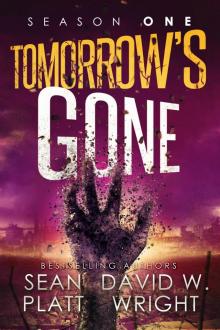 Tomorrow's Gone Season 1
Tomorrow's Gone Season 1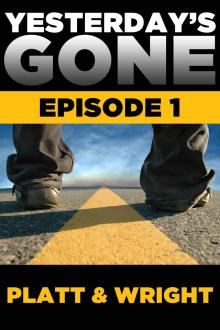 Yesterday's Gone: Episode 1
Yesterday's Gone: Episode 1 Yesterday's Gone: Seasons 1-6 Complete Saga
Yesterday's Gone: Seasons 1-6 Complete Saga The Beam- The Complete Series
The Beam- The Complete Series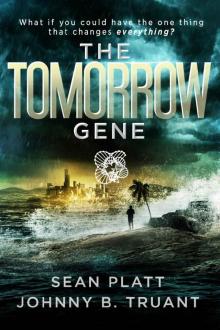 The Tomorrow Gene
The Tomorrow Gene Karma Police: Karma Police Book Two
Karma Police: Karma Police Book Two The Fall (Karma Police Book 5)
The Fall (Karma Police Book 5)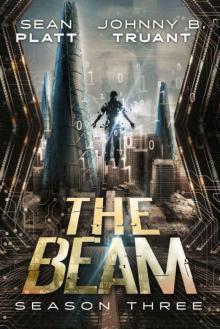 The Beam: Season Three
The Beam: Season Three Resurrection
Resurrection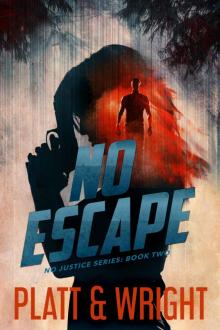 No Escape (No Justice Book 2)
No Escape (No Justice Book 2) Deviant (Karma Police Book 4)
Deviant (Karma Police Book 4)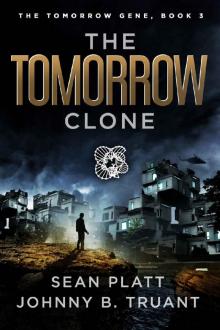 The Tomorrow Clone (The Tomorrow Gene Book 3)
The Tomorrow Clone (The Tomorrow Gene Book 3)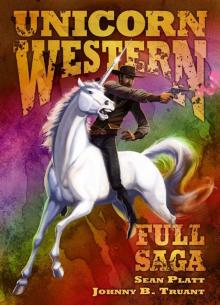 Unicorn Western
Unicorn Western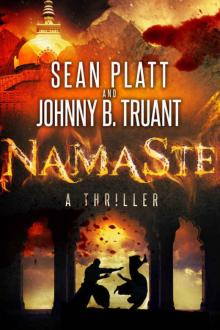 Namaste
Namaste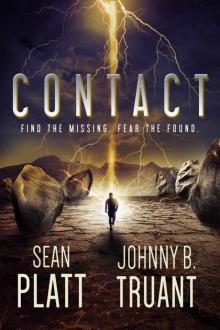 Alien Invasion (Book 2): Contact
Alien Invasion (Book 2): Contact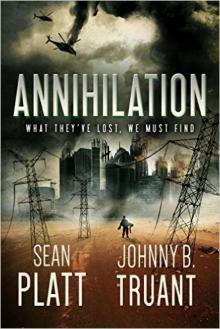 Alien Invasion (Book 4): Annihilation
Alien Invasion (Book 4): Annihilation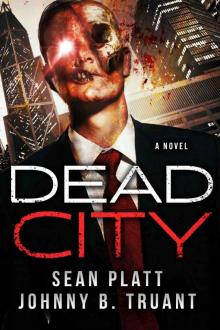 Dead City
Dead City The Eden Experiment
The Eden Experiment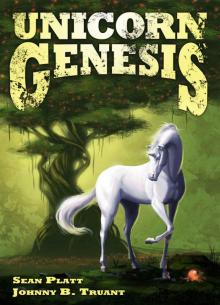 Unicorn Genesis (Unicorn Western)
Unicorn Genesis (Unicorn Western)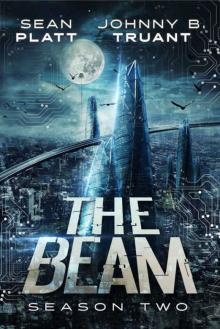 The Beam: Season Two
The Beam: Season Two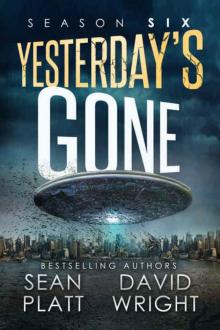 Yesterday's Gone: Season Six
Yesterday's Gone: Season Six Homecoming (Karma Police Book 6)
Homecoming (Karma Police Book 6)![[Alien Invasion 01.0] Invasion Read online](http://i1.bookreadfree.com/i1/03/30/alien_invasion_01_0_invasion_preview.jpg) [Alien Invasion 01.0] Invasion
[Alien Invasion 01.0] Invasion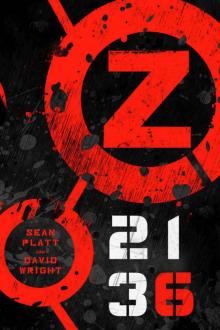 Z 2136 (Z 2134 Series Book 3)
Z 2136 (Z 2134 Series Book 3)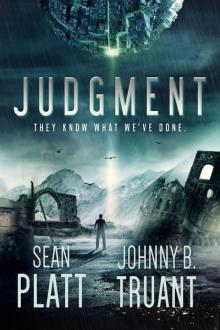 Alien Invasion (Book 5): Judgment
Alien Invasion (Book 5): Judgment Threshold
Threshold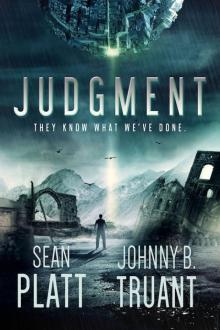 Judgment
Judgment Jumper: Karma Police Book One
Jumper: Karma Police Book One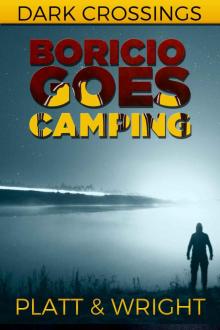 Boricio Goes Camping (Dark Crossings)
Boricio Goes Camping (Dark Crossings) Extinction
Extinction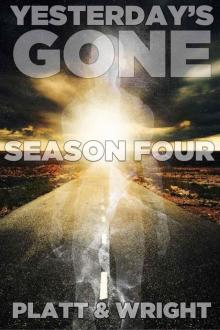 Yesterday's Gone (Season Four): Episodes 19-24
Yesterday's Gone (Season Four): Episodes 19-24![[No Justice 01.0] No Justice Read online](http://i1.bookreadfree.com/i2/04/09/no_justice_01_0_no_justice_preview.jpg) [No Justice 01.0] No Justice
[No Justice 01.0] No Justice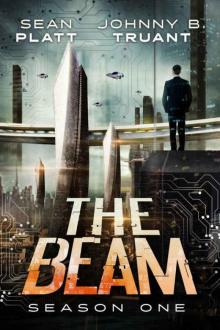 The Beam: Season One
The Beam: Season One La Fleur de Blanc
La Fleur de Blanc The Collectors (Karma Police Book 3)
The Collectors (Karma Police Book 3)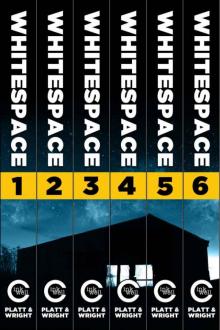 WhiteSpace: Season One (Episodes 1-6 of the sci-fi horror serial)
WhiteSpace: Season One (Episodes 1-6 of the sci-fi horror serial)